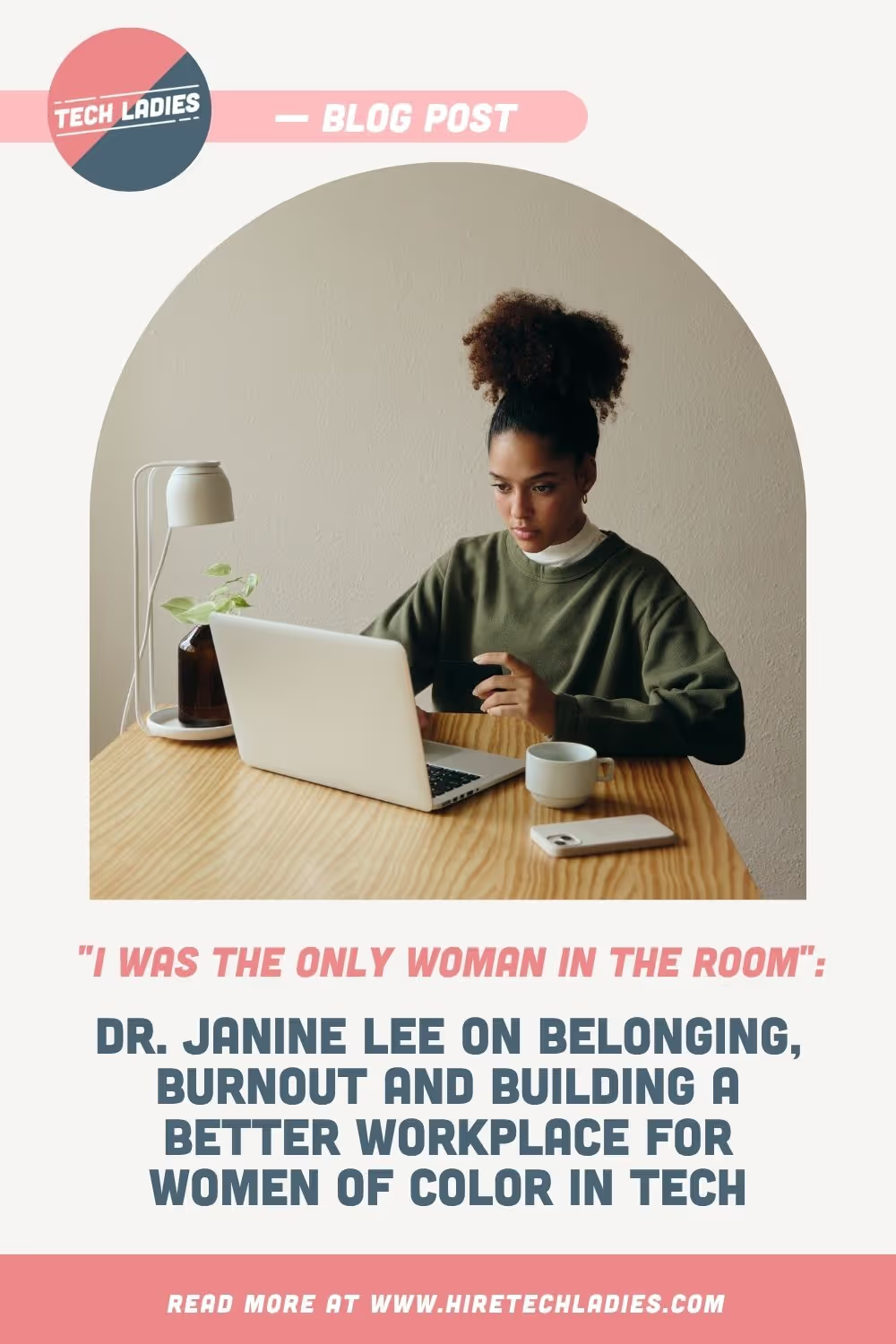When Dr. Janine Lee reflects on her early days in tech, she remembers the isolation all too clearly.
“I walked into my first tech job, and it was a room full of 15 men—and me,” she recalls. “I was the meeting organizer, and I remember thinking, How am I going to corral all these men into a productive conversation?" But at the same time, I was in my own head, wondering, "What will they think of me if I have to use a stern voice to command the room? Will that be un-lady-like?"
It wasn’t just the lack of representation, it was the deeper loneliness that came with it. She often felt left out of after-work socializing, disconnected from the boys’ club dynamic that quietly shaped the culture. And finding other women, especially women of color, in technical roles? Rare.
That experience became the seed for a deeper inquiry: Do other women in tech feel the same way? As it turns out, they do.
When Belonging Feels Out of Reach
Through her research, including her dissertation on workplace belonging for women of color in tech, Dr. Janine heard stories that were all too familiar and all too painful.
Many women reported the same patterns: men taking credit for their work, being excluded from team outings, and the sting of reaching out to the only other woman in their department—only to be met with silence or rejection.
“It was disheartening to hear in the interviews and read in the surveys,” Dr. Janine says. “But it also validated that I wasn’t alone.”
The loneliness women of color experience in tech isn’t just personal; it’s structural. It’s embedded in who gets invited in, who gets heard, and who feels like they truly belong.
PSA: A Simple Framework for Belonging
Dr. Janine’s research surfaced a surprisingly simple, yet powerful, framework to build belonging. She calls it PSA:
- Peer-based support networks
- Sponsorship and mentorship
- Accountability from leadership
Of the three, peer support came out as the strongest contributor to a sense of belonging.
“It’s not rocket science,” she explains. “It’s about having someone to accept you for your authentic self and to talk to at work. Someone who sees you, supports you, and maybe even becomes a friend.”
And here’s the best part: peer support doesn’t require a budget. It’s something anyone can help create, regardless of their title.
Not Just Women Supporting Women
One key insight from Dr. Janine’s interviews: that support doesn’t always have to come from other women. Some of the most meaningful workplace friendships women shared were with male colleagues who showed up as allies, listeners, and trusted collaborators.
“Yes, it’s great when other women are supportive,” she says, “but the reality is, there might not be many other women around. Anyone, regardless of gender, can step up to be a peer ally.”
Culture Eats Happy Hour for Breakfast
Of course, connection doesn’t exist in a vacuum. As Dr. Janine is quick to point out, you can’t fix a toxic culture with a pizza party.
Many women in tech are experiencing severe burnout, especially as they face shrinking budgets and mounting expectations to deliver more with fewer resources. In these high-stress environments, the emotional bandwidth required to build meaningful professional relationships is often depleted.
In those cases, social events feel like performative gestures. Real belonging, she emphasizes, requires a psychologically safe environment, where people aren’t just surviving, but have the space to connect, contribute, grow, and to be themselves.
That’s where the “A” in PSA—Accountability from leadership—becomes crucial.
“If you say you value belonging, you have to walk the talk,” she says. “Leaders need to model inclusion, recognize contributions, and check in with the people who might feel invisible.”
The Personal is Professional
For Dr. Janine, this work is more than academic—it shapes how she leads.
As a global learning executive at a Fortune 500 company and a certified executive coach, she’s intentional about creating spaces where people feel seen and heard.
“If I walk into a room and someone’s being talked over, I speak up. If I see someone sitting alone, I make a point to introduce myself,” she says. “I try to be the leader I needed when I started.”
And in her 1:1 meetings or coaching sessions, she creates space for vulnerability, because that’s where real transformation happens.
“People open up about grief, identity, trauma; all the things that shape how they show up at work,” she says. “When someone feels like they can be vulnerable and authentic in a coaching session, it’s a small but powerful step toward helping them belong at work.”
For more information on Dr. Janine Lee and resources on how to navigate your career as a woman in tech, please check out the following links and let’s continue the conversation!
Website: www.janinelee.com
LinkedIn: www.linkedin.com/in/janinelee
Instagram: www.instagram.com/drjaninelee
TikTok: www.tiktok.com/drjaninelee
HBR Article: https://hbr.org/2024/08/breaking-down-barriers-to-belonging-for-women-of-color-in-tech
LinkedIn Learning Course: https://www.linkedin.com/learning/leading-deib-change-a-methodology
Unstoppable Book: https://www.amazon.com/Unstoppable-Rise-Female-Global-Leaders-ebook/dp/B0D1WNFX36



.png)
.png)
.png)